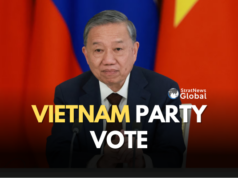In a significant move ahead of his 90th birthday on July 6, the Dalai Lama announced that the institution of the Dalai Lama will continue through the traditional reincarnation process, rather than the alternative “emanation” method discussed in the past. Tibetologist Claude Arpi, speaking to StratNews Global, said this marks a reaffirmation of the centuries-old practice rooted in Tibetan Buddhist tradition, despite the political and logistical complexities it entails in today’s digital world.
“The July 2 statement is short and somewhat vague, but it indicates a clear return to traditional reincarnation,” Arpi explained. “The emanation method, which would have allowed the Dalai Lama to nominate a successor in his lifetime, seems to have been set aside.”
The Chinese government has reacted strongly, with its ambassador to India issuing a sharp statement insisting on Beijing’s authority over the reincarnation process, invoking the controversial 18th-century “Golden Urn” method. Arpi called this “interference in India’s internal affairs,” pointing out that the Dalai Lama has been an honoured guest of India since 1959.
The Golden Urn method—used only once in the Dalai Lama’s succession history—entails drawing lots from an urn under official supervision. Arpi dismissed it as a “political tool” imposed by the Chinese emperor in the 19th century, now revived to legitimize Beijing’s control over Tibetan Buddhism.
This tension recalls the 1995 Panchen Lama controversy, when the Dalai Lama recognized a boy named Gedun Choekyi Nyima, who was then abducted by Chinese authorities. Beijing installed its own candidate, Gyaltsen Norbu, who remains deeply unpopular among Tibetans.
But even if China and the Tibetan clergy select rival Dalai Lamas, Arpi felt a spiritual schism is unlikely. “The Tibetan people will not accept a Chinese-appointed figure,” he said. “They see the Dalai Lama not just as a person, but as a symbol of peace and moral leadership.”
While Arpi expressed regret that the Dalai Lama did not opt for the emanation model—believing it would have avoided confusion—he acknowledged that tradition and internal pressures may have influenced the decision. “In the end, the world may change, but His Holiness still represents something timeless.”
In a career spanning three decades and counting, Ramananda (Ram to his friends) has been the foreign editor of The Telegraph, Outlook Magazine and the New Indian Express. He helped set up rediff.com’s editorial operations in San Jose and New York, helmed sify.com, and was the founder editor of India.com.
His work has featured in national and international publications like the Al Jazeera Centre for Studies, Global Times and Ashahi Shimbun. But his one constant over all these years, he says, has been the attempt to understand rising India’s place in the world.
He can rustle up a mean salad, his oil-less pepper chicken is to die for, and all it takes is some beer and rhythm and blues to rock his soul.
Talk to him about foreign and strategic affairs, media, South Asia, China, and of course India.




